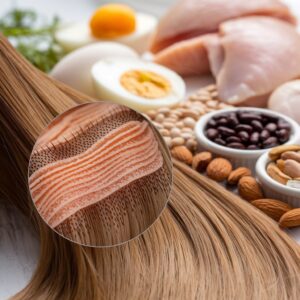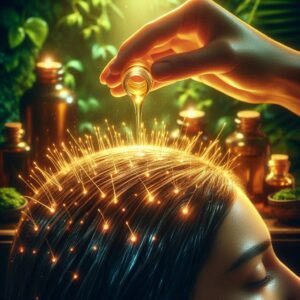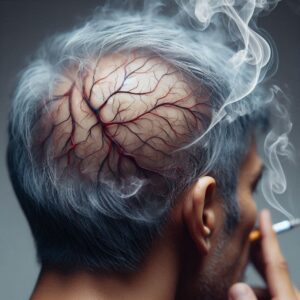The Ultimate Guide to Healthy Hair
Hair health is essential to overall wellness, and everyone should be familiar with the concepts that promote healthy hair. On the skin’s surface, you may find the protein keratin in the hair follicles. Layer one is the medulla; layer two is the cortex; and layer three is the cuticle, which makes up each hair.
How well these layers are taken care of determines the overall health and appearance of the hair. The health of the hair follicle, the living part of the hair, is affected by several things, such as heredity, age, and overall well-being. Keep the follicle in good condition if you want strong and vibrant hair growth.
When one is familiar with the basics of hair health, the three stages of hair development—a resting phase, a transitional phase, and a growth phase—become apparent. Everyday hair loss is normal for this cycle, but excessive shedding might indicate a more serious issue. Keeping a healthy scalp, encouraging strong hair follicles, and supporting the natural development cycle of hair are the cornerstones of good hair health.
Takeaways
- Several factors, such as genetics, diet, and way of life, influence hair health.
- Protein, minerals, and vitamins are the building blocks of healthy hair.
- Proper hair care and maintenance behaviours, such as washing and conditioning your hair regularly, may help prevent damage and promote hair health.
- Coconut oil and aloe vera are natural remedies for hair issues and improve overall health.
- To keep your hair in good condition, you should avoid using products and methods that are harmful to it, such as excessive heat styling tools and chemicals.
 The Importance of a Balanced Diet for Healthy Hair
The Importance of a Balanced Diet for Healthy Hair
Proteins and Their Worth
Protein is required to maintain healthy hair. Inadequate protein intake might result in weak, brittle hair or hair loss.
Hair-Favorite Minerals and Vitamins
In addition, vitamins A, C, and E, along with minerals like zinc and iron, are critical for promoting healthy hair growth. To ensure the body receives the nutrients necessary to maintain healthy hair, it is recommended to incorporate a variety of fruits, vegetables, lean meats, and whole grains into the diet.
Omega-3 Fatty Acids and Hair Repair
Another way to get shiny, moisturised hair is to eat foods rich in omega-3 fatty acids. Some examples of these foods include salmon and flaxseeds. Crash diets or severely restricting food consumption could lead to nutritional deficiencies, negatively impacting hair health. A mineral-rich, well-balanced diet is vital to healthy hair growth and long-lasting colour.
Proper Hair Care and Maintenance
Proper care and maintenance are key to promoting healthy hair. This involves washing your hair regularly with a gentle shampoo and conditioner made specifically for your hair type. Do not overwash your hair; doing so can strip it of its protective oils and lead to dryness and breakage.
In addition, chemical solid treatments and hairstyle tools generate excessive heat breakage. Regular haircuts are essential for healthy hair because they prevent breakage and broken ends. To further reduce the risk of harm, use a wide-tooth comb to detangle wet hair.
Protecting hair from the sun and pool chlorine may also cause damage. Protecting hair from environmental hazards, using gentle products, and avoiding overly harsh heat and chemical treatments are all part of good hair care and maintenance.
 Natural Remedies and Treatments for Hair Health
Natural Remedies and Treatments for Hair Health
Many all-natural remedies and therapies exist for maintaining healthy hair. Massaging the scalp with an essential oil, such as jojoba or coconut, can promote healthy hair growth. The hair follicles will receive more blood as a result. Aloe vera gel has several uses, one of which is soothing the scalp and encouraging the hair to retain moisture.
Also, you may try making your hair treatment with eggs, yoghurt, and honey to nourish and strengthen your hair. When used with regular hair care routines, these natural remedies can help fortify hair from the root up. It is important to remember that natural treatments may not be effective for everyone, even though they help some people.
Seek the advice of a medical professional or dermatologist before trying any novel natural remedies.
Avoiding Damaging Hair Practices and Products
If you want your hair to be healthy, you should avoid certain items. Do not use chemical treatments, such as bleach or perm, or heat tools, like curling wands or flat irons. Damage to the cuticle, as might occur with these treatments, can lead to dryness, breakage, and overall weakening of the hair.
Another method of drying out and harming your hair is using cosmetics containing a lot of alcohol or harsh chemicals. The most important thing is to read labels carefully and use gentle, hair-type-specific products. Another strategy to protect your hair from breakage is staying away from rubber bands with metal clasps or wearing hairstyles that are too tight.
If you want your hair to be healthy and strong, avoid damaging practices and products.
 Lifestyle Factors that Affect Hair Health
Lifestyle Factors that Affect Hair Health
What Effects Does Stress Have on Hair Health?
Hormonal disruptions caused by persistent stress might cause hair thinning or loss.
Cigarette Smoke and Its Effects on Hair
A faster rate of greying and hair loss has been linked to smoking because of the impact on blood flow to the scalp.
Ways to Maintain a Healthy Lifestyle for Your Hair
Dehydration, another consequence of consuming excessive amounts of alcohol, can compromise hair health and appearance. Exercise, sufficient sleep, and stress management are all components of a healthy lifestyle that may help keep hair in good condition. Drinking plenty of water is another way to keep your hair and scalp wet. Knowledge of the lifestyle factors influencing hair health is essential for promoting strong and vibrant hair.
Seeking Professional Help for Hair Concerns
If you have any irritation on your scalp, abnormally high shedding, or are concerned about your hair’s condition, it is important to seek the advice of an expert. A dermatologist or other trained medical professional can help you identify the source of your hair issues and provide insight into treatments and lifestyle changes that can foster healthy hair growth.
Diagnostic testing may be necessary when seeking professional help to identify any underlying medical conditions affecting hair health. Consulting a trichologist or other hair expert may also alleviate concerns about hair health and provide tailored recommendations for each hair type. See a professional if you want your hair issues fixed and want it to grow healthy.
FAQs
In what ways might one’s hair health be affected?
Factors such as genetics, diet, stress, hormonal changes, and environmental risks like pollution and sun exposure can all impact hair health.
How often should I wash my hair to keep it healthy?
While recommendations may differ by hair type, a good rule of thumb is to wash your hair no more than twice or thrice weekly to keep it in the best possible condition.
In the long run, how much of an impact does a healthy diet have on hair?
A well-rounded diet of protein, vitamins, and minerals (such as biotin, zinc, and iron) is essential for healthy hair. A lack of certain nutrients can lead to various health issues, including thinning hair.
What are some tried and tested ways to keep one’s hair in good condition?
Conventional wisdom holds that you can protect your hair from the sun, use a gentle shampoo and conditioner regularly, and avoid chemical treatments and heated styling products.
How can stress impact the health of a person’s hair?
Hair thinning, dullness, and loss are all symptoms of stress, which can harm hair health. However, practising relaxation techniques and caring for yourself can help maintain healthy hair.
At what points can an unhealthy hairstyle become problematic? Can you identify the warning signals?
Hair that is dry, brittle, split ends, excessively thinning, or dull might indicate sickness. Seek the advice of a hair care professional to resolve these issues.
Brought To You By:
The Article: Hair Health: Amity’s Guide To Healthy Hair appeared first on Lane End Hairdresser.
The Article Maintaining Healthy Hair: The Amitys Guide Was Found On https://limitsofstrategy.com


I appreciate the breakdown of hair structure and its connection to overall health, as it ties into how we often overlook these fundamental aspects. The emphasis on the three phases of hair growth resonates with me personally; I’ve noticed my own hair density fluctuates with stress and hormonal changes, which can be concerning.
It’s fascinating how the health of our hair so often mirrors the highs and lows of our lives, isn’t it? That three-phase cycle of hair growth—anagen, catagen, and telogen—sounds all neat and tidy, but in reality, it can feel like a drama-filled soap opera. You’re starring in Hair: The Unruly Chronicles. One episode, you’re feeling on top of the world, and your hair’s all thick and luscious, and the next, stress or a hormonal rollercoaster has you questioning if the only thing left on your head is a few lonely stragglers contemplating retirement.
It really is intriguing how our hair can reflect the ebb and flow of our lives. I’ve definitely experienced those moments when I felt unstoppable, and my hair seemed to agree—flowing, vibrant, and full of life. Then there are those times, often tied to stress or major life changes, when it feels like my hair is almost taking its own break from the chaos. It’s like it knows when I’m not quite aligned.
Your observations about hair and life’s rollercoaster are spot on. It’s fascinating how something that seems so superficial can hold such a deep connection to our emotional states. I’ve had those moments, too, where I notice my hair changes along with my moods. When life is flowing smoothly, my hair feels like it’s thriving, bouncing as I move, almost like it’s celebrating those moments with me. But when stress creeps in, it can feel like my hair really is trying to retreat.
It’s interesting how hair health can often reflect what’s happening in our bodies, isn’t it? The connection between stress, hormonal shifts, and hair density really does highlight the importance of overall wellness. I’ve read studies that suggest mindfulness and proper nutrition can help mitigate some of those fluctuations. Have you found any strategies that work for you during those more stressful times?
I completely relate to your observations about hair density fluctuating with stress and hormonal changes. It’s fascinating how our bodies communicate through things like hair growth, isn’t it? I’ve noticed similar patterns in my own hair—and it’s made me more conscious of the connection between mental health and physical symptoms.
It’s great to see how deeply you’ve connected with the topic. Our bodies do send us signals, and hair is a surprisingly clear indicator of what’s happening underneath the surface. I’ve noticed that when I experience stress or changes in my routine, my hair seems to respond in its own way.
It’s interesting how our bodies can communicate with us in such subtle ways, isn’t it? I’ve definitely experienced something similar with my own hair—when life gets overwhelming or I’m really stressed, it sometimes feels like my hair takes on its own personality. I’ve also read that stress can lead to changes in hair texture and even hair loss, which makes me wonder how closely our mental state is tied to our physical appearance.
I really appreciate how you connect the dots between stress, hormonal changes, and hair density. It’s remarkable how our bodies serve as these intricate barometers for our mental and emotional state. I’ve seen similar changes in my own hair, particularly during periods of significant stress, which makes it hard not to ponder what else might be happening on a deeper level.
It’s interesting to think about how interconnected everything is within our bodies, isn’t it? The way stress can manifest in our physical appearance, like changes in hair density, really highlights that mind-body connection. I’ve definitely noticed similar effects in my own life. Stressful periods seem to trigger not just hair changes, but also skin issues and fatigue. It’s as if our bodies are constantly communicating, sending us signals about our mental and emotional health.
It’s really fascinating to dive into the way our bodies communicate with us, especially through stress. I’ve had my share of moments where I noticed changes in my skin or hair around particularly stressful times, and it’s almost as if my body is sending me a message that I need to pay attention to my mental state.
You’ve touched on something really profound. The idea that our body reacts to stress in such visible ways can be surprising, yet it makes so much sense when you think about it. It’s fascinating how stress might not just linger in our minds but also leaves its mark on our skin and hair.
It’s interesting how our bodies indeed act as these intricate barometers for our mental and emotional state. I’ve been reflecting on that a lot too, especially in light of how stress manifests physically, like in hair density or even skin health. I’ve noticed changes in my own hair during particularly stressful times, and it makes you wonder about the connection between our emotional well-being and physical health on a broader scale.
It’s interesting to think about how our experiences can shift not just our hair but also our perception of beauty; I recently came across a piece that beautifully explores the allure of brunette hair, delving into its unique charm and depth.
‘Brunette Hair: Discovering Its Stunning Beauty’
https://lonelyspooky.com/brunette-hair-discovering-its-stunning-beauty/.
It’s interesting how intertwined everything is, isn’t it? Our bodies can often feel like this complex puzzle where one piece affects another in unexpected ways. Stress really is a sneaky culprit. I’ve noticed how easily it sneaks into various aspects of life; hair is just one visible marker, but there’s so much more happening under the surface.
It’s intriguing how our bodies often reveal what’s happening internally, isn’t it? Hair loss or changes in density can really serve as signals of our overall well-being. The link between stress, hormones, and hair health often gets overlooked, but recognizing it can be a powerful step towards understanding ourselves better.
The exploration of hair health within your guide resonates with many of us who often overlook the foundational role that hair plays in our overall wellness. It’s intriguing how you highlighted the anatomy of hair strands and their lifecycle—the medulla, cortex, and cuticle all contribute significantly not just to the aesthetic aspect but also to a person’s self-esteem and identity.
It’s interesting that you bring up the connection between hair and self-esteem; it’s something that often gets overlooked, yet it holds so much weight in how we perceive ourselves. The anatomy of hair—especially how each layer serves its purpose—doesn’t just inform us about the science but also how fragile and complex our sense of identity can be.
I really appreciate your thoughts on the connection between hair and self-esteem. It’s fascinating how something as seemingly simple as hair can play such a complex role in our identity. Not only does the anatomy of hair reflect our biology, but how we style or treat it often carries deeper meanings related to who we are or aspire to be.
You bring up such a valuable point about the importance of hair in shaping our identities. It’s interesting how personal experiences can really tie into our hair choices. For me, changing my hairstyle has always been a kind of reset button. I remember when I decided to cut my long hair into a bob—it felt like shedding a part of my past and embracing something new.
I completely resonate with what you shared about hair being a reset button; it really can mark significant moments in our lives. When I decided to shave my head a few years ago, it felt like the ultimate release from past expectations. It’s fascinating how society places so much emphasis on our hairstyles, almost dictating how we express ourselves.
I totally relate to your experience; it’s fascinating how our hair choices can reflect our journeys, and I recently came across an article that beautifully explores the allure of brunette hair, which might resonate with your story.
‘Brunette Hair: Discovering Its Stunning Beauty’
https://lonelyspooky.com/brunette-hair-discovering-its-stunning-beauty/.
It’s fascinating how a change in hairstyle can mirror shifts in our lives. That idea of a bob as a reset button really resonates; it’s like your hair can tell a story of growth and transformation. I think many people experience that connection. Sometimes, a haircut can feel like putting on a new lens through which to view the world.
You’ve touched on something really profound. The connection between hair and self-esteem can so easily be overlooked, yet it intertwines with social perceptions and personal identity in complex ways. It’s fascinating how something as simple as the layers of hair—cuticle, cortex, and medulla—can mirror the many layers in our sense of self. Each layer in our identity serves its own purpose, just like those in hair, and when one is affected, it can feel like the whole structure is vulnerable.
You’ve really captured an essential aspect of how we perceive ourselves and how those perceptions can shift with something as seemingly trivial as hair. It’s so interesting to think about how hair can serve not just as a physical feature but as a cultural symbol of identity and status. In many societies, certain hairstyles can signify belonging, defiance, or even hope. I remember the movement around the natural hair phenomenon—how it encouraged many to embrace their authentic selves and challenge societal standards of beauty.
You make such a great point about hair being more than just, well, hair. It’s like a hidden language—no one needs a handbook to know what a slicked-back bun might say about someone’s ambition or how a colorful mohawk can scream “I’m definitely not following the herd.” The natural hair movement? That was a game changer. It was like giving a hug to all those who felt they had to conform to rigid beauty standards.
You’ve captured such an interesting perspective on hair as a form of expression. It really is fascinating how styles can convey so much about a person without a single word. I remember when I first started experimenting with my own hair, shifting from a conventional cut to bolder styles, and it felt like I was reclaiming a part of my identity. Hair can be a canvas for creativity and individuality, reflecting our passions and beliefs.
You’ve really captured the essence of how deeply intertwined our hair can be with our self-image. It’s interesting to think about those layers—cuticle, cortex, and medulla—as metaphors for our own identities. Each of us has experiences and societal expectations that shape those layers, often in ways we don’t initially recognize.
You raise such a compelling point about the interplay between hair and self-esteem. It’s fascinating how something so seemingly simple can have such a profound impact on our identity. I often think about how much time people spend styling their hair or choosing cuts that feel representative of who they are. It’s like each strand carries our stories and choices, especially in a world where appearance can affect opportunities and how we relate to one another.
You’ve really hit the nail on the head with your observation about hair and self-esteem. It’s fascinating to think about how much a hairstyle can reflect our personal narratives. When you mention that each strand carries our stories and choices, it resonates deeply.
It’s interesting how the exploration of hair health can really tap into deeper themes of identity and self-esteem. The medulla, cortex, and cuticle might seem like technical terms, but they each represent such unique characteristics of who we are. Personally, I’ve found that the state of my hair often reflects my lifestyle—when I’m stressed or not taking care of myself, it shows. It’s almost as if our hair serves as a mirror for our internal wellness.
You’ve really hit on something profound with that reflection on hair. It’s fascinating how something that seems so physical can reflect our inner state. The medulla, cortex, and cuticle might sound like they belong in a science class, but they really do hold stories about our lives, perceptions, and even our struggles.
It’s intriguing to think about how something as everyday as hair can encapsulate so much of our experiences. Beyond its biological structure, hair is often intertwined with our cultural identities and how we express ourselves. For many, it’s a canvas for personal stories—like those bold decisions to dye it a new color during transformative moments in life or the significance of wearing it a certain way to honor traditions.
You’ve touched on such an important point about hair health and its connection to our overall wellness. It’s fascinating to think about how something that seems purely aesthetic plays such a pivotal role in our self-perception and identity. I can relate to that; I’ve noticed how changes in my hair, whether it’s a new cut or color, can really impact my mood and confidence.
It’s fascinating to see how the structure of our hair is directly tied to its health, as you mentioned! The connection between the hair layers—medulla, cortex, and cuticle—really highlights the importance of good care practices. Personally, I’ve found that incorporating natural oils, like argan and jojoba, not only helps maintain the cuticle but also adds to the overall shine and resilience of my hair.
I completely agree with you about the importance of hair structure and how it reflects overall health. It’s interesting how the medulla, cortex, and cuticle all play distinct roles, but yet function so harmoniously together. Your experience with natural oils like argan and jojoba resonates with me; I’ve also noticed a significant improvement in my hair’s texture and appearance since adding them to my routine.
I recently came across an insightful piece about brunette hair that beautifully explores its unique characteristics and care tips, which really resonated with my own experiences in maintaining healthy locks.
‘Brunette Hair: Discovering Its Stunning Beauty’
https://lonelyspooky.com/brunette-hair-discovering-its-stunning-beauty/.
It’s interesting to hear your thoughts on the importance of hair structure when it comes to health. The way you mention the medulla, cortex, and cuticle really underscores how every layer plays a role in keeping our hair strong. I’ve found that taking care of my hair is similar to nurturing other aspects of self-care; it’s all about balance and consistency.
This is an incredibly insightful guide on healthy hair! I appreciate how you’ve broken down the structure of hair and emphasized the importance of the follicles. It’s something that many of us tend to overlook when we’re focusing on hair care routines, but understanding the anatomy truly lays a solid foundation for better hair health.
I’m glad you found the guide helpful! It’s funny how we often zero in on the products and routines while the actual foundation—our hair structure—gets pushed to the back. Learning about the follicles and what they need can definitely change how we approach hair care.
I completely agree with you; it’s so easy to focus on the products and forget about the fundamental aspects of our hair, like its structure and health. I’ve been trying to educate myself more about the science behind hair care, especially since I’ve noticed how much my own routine has improved since I started considering my hair’s unique needs.
I can really relate to what you’re saying about focusing on the fundamentals of hair health. It’s fascinating how much we sometimes overlook the science behind it all. For me, diving deeper into the different hair types and their specific needs has been eye-opening. I started experimenting with ingredients that suit my hair’s texture instead of just following trends.
I can totally relate to your experience. It’s fascinating how much our hair can tell us about our overall health and well-being. Delving into the science behind hair care has really opened my eyes, too. I think it’s essential to consider factors like pH balance, moisture levels, and even how different ingredients interact with our hair type.
I completely agree with you; it’s truly intriguing how much insight our hair can provide about our well-being. I’ve definitely noticed that when I take better care of my hair—like adjusting to products that suit my individual hair type or being mindful of the pH balance—it seems to reflect positively not just in its appearance but in my overall mood as well.
I completely relate to that perspective. It’s so easy to focus on the latest products or trends, but understanding our unique hair structure really shifts how we approach hair care. After I started learning about the different types of hair follicles and their specific needs, it changed my routine significantly. I felt more empowered to choose products that genuinely worked for me rather than just following what’s popular.
I’m glad you found the guide helpful! It’s true—when we see shiny, flowing locks in the mirror, we tend to focus on the ends and how much we can enhance our hair’s TikTok-worthy attributes. Yet, I think the follicles deserve a little standing ovation of their own. They’re like the secret service agents of your hair; always working hard, often unnoticed, and absolutely vital for keeping everything running smoothly.
I’m glad to hear you found the guide insightful. It’s true that many people focus on surface-level treatments—shampoos and styling products—without considering the importance of hair structure. It’s fascinating how hair follicles play such a crucial role in not just how our hair looks but also how healthy it is overall.
I completely resonate with what you’ve shared about the focus on hair structure. It’s easy to get caught up in the cycle of products promising instant results, but so much of hair health really does start at the follicle level. I’ve discovered that understanding this has not only helped my hair but also changed my approach to overall wellness.
It’s so refreshing to hear someone else share that perspective on hair health. You’re spot on about getting caught up in the allure of those products that promise quick fixes. There’s a certain temptation in wanting instant results, especially when we’re bombarded with marketing that suggests our hair can transform overnight. The reality, though, is much more about the long game.
Your exploration of hair health taps into a deeper conversation about self-care and how it connects to our overall well-being. It’s fascinating how many people overlook the importance of hair health as part of their wellness routine, often focusing solely on skin or physical fitness. The mention of keratin and the three layers of hair really highlights how integral our understanding of hair structure is to fostering proper care.
I completely agree with your perspective on hair health as a crucial part of self-care. It’s interesting how we often prioritize skin care and fitness, sometimes neglecting our hair in the process. I think hair health can be such a personal reflection of how we feel about ourselves. When I start prioritizing my hair care routine, it often leads to a broader sense of well-being—kind of like creating a little ritual that signifies taking time for myself.
This post resonates with me, especially the emphasis on understanding the hair growth cycle. I’ve always struggled with my hair’s health, particularly during stressful periods. It’s interesting how stress can disrupt that balance and lead to excessive shedding.
It’s fascinating how the structure of our hair can tell such a compelling story about our overall health and well-being. I’ve come to realize just how interconnected our bodies are, and it’s amazing to think about how our hair reflects aspects of our lifestyle and choices. For instance, I’ve noticed that when I stress less and incorporate more whole foods and hydration into my routine, my hair feels thicker and more vibrant.
I’ve always been fascinated by the science behind hair care, especially since my hair seems to have a mind of its own. One week it’s a smooth cascade, and the next it’s resembling an overcooked spaghetti noodle. I find myself wondering if it’s the hair’s way of campaigning for more attention—should I be holding daily pep talks with my follicles?